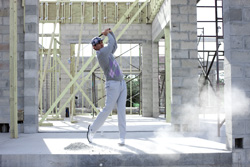West Ham United take on Tottenham Hotspur again this week in a long-awaited tussle that has the credibility of English sport in its hands.
Now before fans of both teams check their fixture lists I should point out that a crucial three points are not up for grabs, nor a Wembley final. This match-up is on a neutral venue and will decide where each team will play their football in the future.
The battle this time is over the future use of the Olympic Stadium, which was the centre point of the winning bid to host the 2012 Olympic Games.
So, what's at the centre of the debate and why has it become so heated? On Friday the Olympic Park Legacy Committee (OPLC) will meet to decide what will happen to the Olympic Stadium after the London 2012 Games. Central to this decision are the promises made in the original bid to win these Games for London.
There has been some debate as to whether or not London made any promises in terms of the Olympic Stadium and athletics in the run up to the decision in Singapore in 2005.
To avoid doubt, London stated:
The 2012 Olympic and Paralympic Games will provide an opportunity to deliver much needed sports infrastructure to the UK - and London in particular.
Specific plans for the facilities to be retained in the park include... the Olympic Stadium - conversion to a 25,000 seat multi-purpose venue with athletics at its core.
At the time this decision was made in Singapore, English credibility was very much an issue. While the Olympics is littered with examples of broken promises, the English bid was suffering from previous disasters, such as the embarrassment of the abandoned World Athletics Championships at Pickett's Lock in 2001, the broken FA promises to the Germans ahead of the latter's ultimately successful hosting of the 2006 World Cup.
Even before then, the Football Association hijacked a joint bid to build a National Stadium for football, rugby league and athletics leaving the latter two sports without a suitable venue to host world events.
Sir Craig Reedie, chairman of the British Olympic Association when it proposed the original bid and now a member of the International Olympic Committee's executive board is certainly in no doubt, stating:
"Commitments had to be made to convince the International Olympic Committee that there would be a comprehensive sporting legacy in addition to the physical legacies in the proposed new Olympic Park."
As London was very badly off for sports facilities, it led to a proper venue strategy, providing post-Games uses for the main aquatics centre (very badly needed), the velodrome (an addition to an existing cycling centre), a flexible community and events use for the handball arena, a hockey centre, a regional tennis centre and, perhaps most important in Olympic eyes, a reduced main stadium with an athletics track.
Athletics is key to the current debate and the various leaders of global and national associations have been quick to provide their view in recent weeks. Charles van Commenee, head coach of UK Athletics, Lamine Diack, the global athletics chief and former Olympians Daley Thomson and Kelly Holmes have all backed West Ham's bid.
In the red corner (or, rather, claret), West Ham, in conjunction with Newham Council, propose to comply with the original stadium legacy plan, albeit with a larger 60,000 capacity compared to the original version of 25,000. The council is also committing investment in continued community use, a promise at the heart of the Olympic movement, aimed at inspiring the youth of today to become the stars of tomorrow. On the face of it, few could argue.
Recently even Lord Coe has added to the debate, arguing that there is a 'moral obligation' to allow for a multi-sport legacy. "This is about our ability to be taken seriously again in world sport", added Coe.
Enter, in the blue (but predominantly white) corner, Tottenham Hotspur. Their argument is that they are providing a more practical solution by taking the Olympic Stadium and developing it into a pure footballing environment with the $80 million of public money available to provide a legacy being spent to redevelop the current National Athletics Stadium at Crystal Palace.
The heart of their debate is that no football fan wants to watch a match where they are distanced from the action by an athletics track and that no athlete would want to compete in a massive half-empty stadium. Practically, they do not believe that sharing a venue is the most effective use of the funds available. Supporters of their bid also argue that Spurs will actually fill a 60,000-seater stadium which West Ham will not!
Simon Clegg, former British Olympic Association chief executive, believes that athletics should have a separate venue rather than become part of what could become a massive white elephant - there's little point in leaving a legacy if it is not sustainable.
Ironically, Tottenham's local council, Haringey, are also backing the West Ham bid, although that has more to do with their fear of losing Premiership football, claiming that the loss of Spurs would 'devastate' the local area.
Personally, I can appreciate their argument and agree that, in an ideal world, all fans want to be as close to the action as possible. However, for me, that's not the point. A promise has been made that should be kept to ensure the future credibility of a nation. I also believe that, following a successful Games, many future athletes will be inspired by participating in the Olympic Stadium, whether full to capacity or not.
I also believe that, with various interested parties working together, the revamped stadium can be sustainable, particularly working within the community, although 60,000 for West Ham may be a little ambitious!










